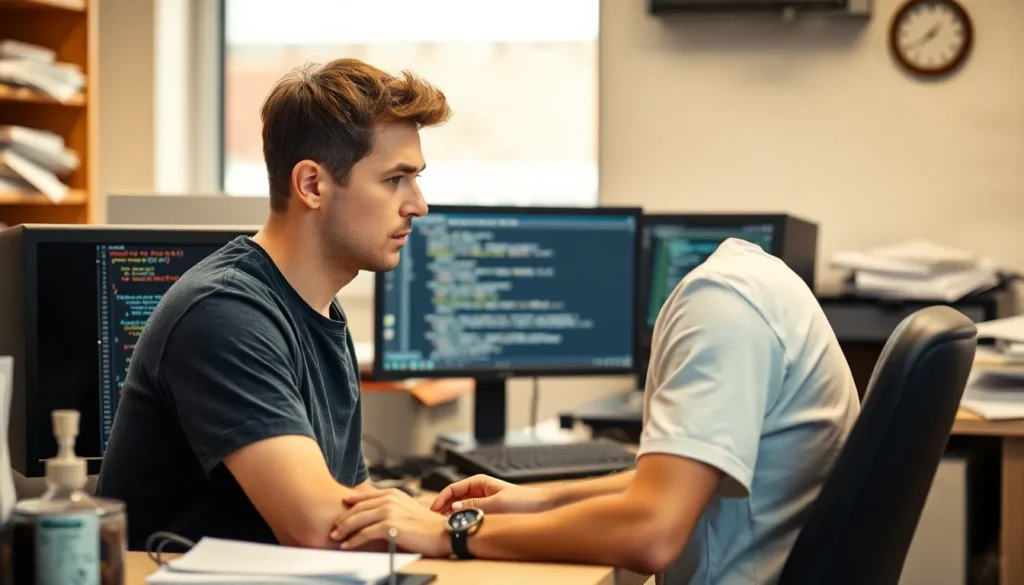Table of Contents
ToggleNavigating the choppy waters of divorce can feel like trying to teach a cat to swim. It’s messy, chaotic, and often leaves everyone involved a bit frazzled. For parents, the stakes are even higher. They need to ensure their kids don’t end up with a lifetime supply of therapy bills. Enter parenting classes specifically designed for those going through a divorce—your lifeboat in this stormy sea.
These classes aren’t just about learning how to juggle co-parenting schedules or mastering the art of civil communication with an ex. They’re also about finding the humor in the madness and building a supportive community. With expert guidance and a sprinkle of laughter, these classes help parents turn a tough transition into an opportunity for growth. After all, who says you can’t learn a thing or two while dodging flying toys and navigating school pick-ups?
Understanding Parenting Classes for Divorce
Parenting classes for divorce serve a crucial role in helping parents navigate the complexities of co-parenting during and after the separation process. These classes focus on equipping parents with the necessary skills and strategies to prioritize their children’s well-being.
Purpose of Parenting Classes
The primary purpose of parenting classes is to improve communication and conflict resolution between divorced parents. Classes cover essential topics such as effective co-parenting strategies, understanding children’s emotions during divorce, and establishing routines to foster stability. Innovative techniques may include role-playing scenarios and group discussions that encourage shared experiences. These sessions promote emotional growth while minimizing conflicts and misunderstandings, ultimately benefiting both parents and children.
Who Should Attend?
Parents experiencing separation or divorce, regardless of their experience level, should consider attending parenting classes. Classes target individuals facing challenges like custody arrangements, visitation schedules, or emotional stress. Stepparents and caregivers involved in the children’s lives may also find these sessions beneficial. The inclusive environment creates an opportunity for participants to learn from one another’s experiences while receiving support from qualified instructors, fostering a sense of community during a potentially isolating time.
Benefits of Parenting Classes

Parenting classes provide essential support for divorced parents, offering numerous advantages that enhance family dynamics during a challenging transition.
Improving Communication
Effective communication fosters better relationships between parents and children. Parenting classes teach techniques to express thoughts and emotions clearly while actively listening to children’s needs. Strategies such as using “I” statements instead of “you” accusations help minimize misunderstandings. Educators guide parents in discussing sensitive topics, fostering openness and reducing hostility. Regular practice in these skills builds confidence and improves interactions, ultimately benefiting children’s emotional well-being. Through group discussions, parents share experiences, gaining insights that further enhance their communication abilities.
Reducing Conflict
Conflict often arises from miscommunication or misunderstandings post-divorce. Parenting classes equip parents with conflict resolution strategies tailored for co-parenting situations. Classes emphasize the importance of maintaining focus on the children’s best interests, encouraging parents to set aside personal grievances. Techniques like negotiation and compromise promote a cooperative environment. Role-playing scenarios allow parents to practice addressing potential conflicts before they escalate. Strengthening these skills leads to a more harmonious co-parenting relationship, reducing stress for both parents and their children.
What to Expect in a Parenting Class
Parents can expect a comprehensive and supportive environment in parenting classes designed for individuals navigating divorce. These classes focus on essential skills, strategies, and support systems crucial for effective co-parenting.
Course Structure and Topics Covered
Classes typically include structured modules addressing topics like co-parenting strategies, children’s emotional responses during divorce, and establishing routines that promote stability. Participants engage in activities such as role-playing and group discussions, enhancing learning through real-life scenarios. Topics also cover effective communication techniques, conflict resolution, and cooperative parenting, ensuring that parents receive practical tools to foster a positive family dynamic.
Duration and Format
Parenting classes vary in duration, generally spanning from four to eight weeks. Each session often lasts one to two hours, accommodating busy schedules while providing ample time for discussion and interaction. Formats may include in-person workshops or online sessions, offering flexibility for all participants. Interactive components and real-world applications ensure that parents can implement learned strategies immediately.
Finding the Right Parenting Class
Finding the right parenting class for divorce involves identifying options that meet specific needs and schedules. Parents should consider various factors, including proximity, curriculum focus, and class format.
Researching Local Options
Researching local options includes exploring community centers, family courts, or social service organizations that offer parenting classes. Many states mandate these classes for divorcing parents, leading to structured programs that address key topics. Evaluating instructors’ qualifications and participants’ reviews is essential for determining potential effectiveness. Networking within local parenting groups can also yield recommendations for classes that other parents found helpful.
Online Parenting Classes
Online parenting classes present flexible solutions for parents facing time constraints. Numerous platforms provide comprehensive courses tailored to divorce-related challenges. Benefits include the ability to access materials at any time, ensuring convenience for busy schedules. Classes often feature interactive elements like video lectures and discussion boards, fostering engagement and support. Parents should review course outlines to ensure they cover essential topics such as communication strategies and child emotional well-being during divorce.
Parenting classes for divorce offer invaluable support during a challenging transition. They equip parents with essential skills to foster effective co-parenting relationships while prioritizing children’s emotional well-being. By enhancing communication and providing conflict resolution strategies, these classes create a nurturing environment for personal growth and shared learning.
The benefits extend beyond practical skills, fostering a sense of community and understanding among participants. Parents can navigate their new realities with confidence, ensuring their children feel secure and supported. Ultimately, investing time in these classes can lead to more harmonious family dynamics, making the journey through divorce a little easier for everyone involved.




